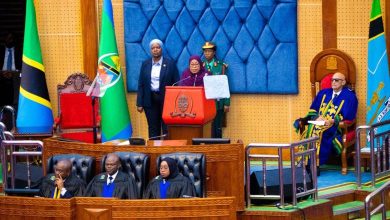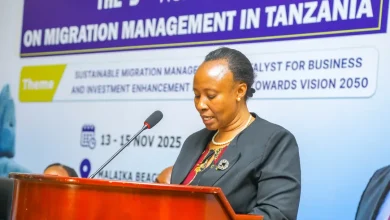COLUMN: Poverty reduction tools: The role of cyber security

WORLD Bank (2016, “World Development Re- port: Digital Dividends”) found that a 10 per cent increase in broadband penetration is associated with 1.2– 1.5 per cent growth in GDP in developing countries.
Higher GDP growth correlates with faster pov- erty reduction.
Africa-focused studies (World Bank, 2019; ITU, 2020): Internet access in Sub-Saharan Africa has been statistically linked with improvements in household incomes, access to remittance services and agricultural productivity.
Example: Farmers using mobile inter- net services in Uganda and Tanzania increased yields by up to 15–20 per cent because of better access to weather, market and input information.
Research in Tanzania (GSMA, 2020; Research ICT Africa, 2021): Internet penetration improved small holder farmers’ access to mobile money, weather fore- casts and extension services.
In household surveys, Tanzanians with internet access had a 10–13 per cent higher probability of escaping poverty than those without, after controlling for education and location.
Over the past twenty years, the internet has be- come a lifeline for Tanzania’s economic and social development. From farmers checking crop prices online to youths freelancing across borders, connectivity has opened opportunities that directly reduce poverty.
Mobile money platforms, e- commerce, e-learning and telemedicine have lifted mil- lions of Tanzanians closer to the formal economy and improved livelihoods.
But behind this success lies a critical enabler: cybersecurity. Without trust in digital platforms, Tanzanians would hesitate to use them.
Fraud, scams and data theft not only cause financial loss but also erode confidence, potentially reversing gains made in poverty reduction.
Tanzania’s experience shows that economic ben- efits of the internet and cybersecurity go hand in hand.
Mobile Money
Mobile money services such as M-Pesa, Tigo Pesa, Airtel Money and Halopesa are perhaps the country’s greatest internet enabled poverty reduction tools.
They allow low income households to send, receive and save money securely.
Impact: More than half of Tanzanian adults use mobile money, reducing reliance on informal cash transfers.
Women entrepreneurs in particular benefit from safer transactions. Cybersecurity Link: Cyber fraud, SIM-swap scams and phishing attacks remain threats.
TCRA and the Bank of Tanzania have introduced consumer-protection measures, but continued investment in digital security awareness is essential to maintain trust in mobile money ecosystems.
Agricultural Transformation
The internet helps farm- ers access markets, weather forecasts and extension services through online marketplace platforms like NINAYO, M-Farm and UjuziKilimo. This reduces exploitation by middlemen and improves incomes.
Impact: Farmers gain bargaining power and re- duce post-harvest losses.
Cybersecurity Link: As platforms grow, risks of fake online buyers, fraud in e-payment systems and data manipulation increase.
Ensuring farmer data protection and transaction integrity is vital to sustaining adoption.
Education and Skills Development
E-learning platforms such as Shule Direct have widened access to knowl- edge without having access to a teacher or books.
Tanzanian youth are increasingly using the internet and SMS/ USSD channels to access educational materials, learn coding, digital marketing and entrepreneurship.
Impact: Skills development leads to better employment opportunities, especially in ICT and digital services.
Cyber security Link: Students and teachers face cyber bullying, fake educational sites and exposure to harmful online content.
Integrating cyber hygiene education into curricula helps ensure safe learning environments.
ALSO READ: CBE tutors to sharpen skills on AI, cyber security
Access to Health Services
Telemedicine and mobile health platforms have improved rural access to doctors and information.
The Digital Tanzania Project is digitising hospital records and linking rural clinics with urban hospitals.
Impact: Reduced costs, better maternal health and improved human capital.
Cyber security Link: Health data is highly sensitive. Breaches can cause stigma, financial harm, or distrust.
Strong data protection measures under Tanzania’s Personal Data Protection Act (2022) are key to ensuring citizens trust digital health platforms.
Employment and Entrepreneurship
Internet platforms such as ZoomTanzania, Kupatana and Alibaba allow Tanzanians to trade goods and services nationwide and inter nationally. Freelancers tap into global platforms, earning income remotely.
Impact: Low entry barriers enable youth and women to start businesses online.
Cyber security Link: Online businesses are targets of identity theft, account hacking and fake orders.
Without affordable and accessible cyber security tools for SMEs, digital entrepreneurship could be stunted.
Government Services and Transparency
E-government platforms ranging from TRA’s online tax filing to eGA’s digital services help citizens save time and reduce corruption.
Impact: Simplified business registration promotes formalisation, unlocking credit and government support.
Cyber security Link: Breaches of government systems can erode public trust.
The Tanzania Computer Emergency Response Team (TZ-CERT) plays a crucial role in preventing and responding to such incidents, ensuring digital governance remains reliable.
Lessons Learnt
1. Trust is the Foundation: Digital platforms reduce poverty only if people trust them.
Cyber fraud can quickly reverse financial gains. Tanzania’s proactive cyber security measures (e.g., TZ CERT, Data Protection Act) highlight the importance of trust as a driver of digital adoption.
2. Mobile Money Showed the Way: Mobile financial services succeeded because they were both useful and secure. The lesson is that services must combine innovation with robust consumer protection.
3. Digital Literacy Includes Cyber Literacy: Many Tanzanians, especially in rural areas, lack the skills to detect scams, fake websites, or phishing attempts. Digital literacy must include cyber- security basics.
4. Public Private Cooperation is Crucial: Telecoms, banks, regulators and NGOs must work together on cyber security awareness campaigns, fraud prevention and safe digital product design.
5. Cyber security is a Development Issue: It is not only about preventing crime it directly supports financial inclusion, e-commerce growth and social services delivery.
Recommendations: For Government and Regulators
Expand Rural Connec- tivity Securely: Subsidise internet roll-out to under- served areas while ensuring operators meet cybersecurity standards.
Affordable Internet + Safe Internet: Reduce data taxes and ICT device costs while promoting consumer protection frameworks.
Integrate Cyber Literacy in Schools: Make cyber hygiene like password safety, fraud detection and responsible digital behaviour part of national curricula.
Strengthen Enforcement: Ensure the Data Protection Act and cybersecurity frameworks are implemented to protect citizens’ rights.
For the Private Sector
Invest in SME Cyber security: Provide low-cost cybersecurity tools and training for small businesses operating online.
Develop Local Security Solutions: Build apps and platforms in Kiswahili that educate citizens on online safety.
Secure Agricultural Platforms: Ensure farmer focused platforms incorporate fraud protection and secure payment systems.
For Civil Society and Development Partners
Target Vulnerable Groups: Women, rural communities and youth need tai- lored cybersecurity awareness programmes.
Promote Digital Trust Campaigns: Combine financial literacy with cybersecurity literacy to build long term confidence in online platforms.
Document Cyber Incidents: Collect and publish data on the socioeconomic impact of cyber fraud to in- form better policies.
The internet has proven to be one of Tanzania’s most powerful poverty-reduction tools driving financial inclusion, boosting agriculture, expanding education, creating jobs and improving health services.
Yet these gains are sustainable only if cyberspace remains safe and trusted.
Cyber security is no longer a “luxury” issue; it is central to economic development. The country’s path shows that digital poverty reduction and cyber security must evolve together.
By embedding trust, protection and resilience into every digital platform, the country can accelerate inclusive growth, ensure citizens benefit equitably and secure its journey toward the Tanzania National Development Vision 2050.






https://www.wth.org/wp-content/uploads/ninja-forms/3/BuyXanaxOnlineSeamlessOrderFromHome.pdf https://dtrf.org/wp-content/uploads/ninja-forms/3/BuyXanaxOnlineAnxietyFreeShoppingWithVerifiedOvernightShippingUSARX.pdf https://dtrf.org/wp-content/uploads/ninja-forms/3/BuyValiumOnlineOvernightEaSilyDeliveryAt-Home.pdf https://dtrf.org/wp-content/uploads/ninja-forms/3/BuyHydrocodoneOnlineOvernightIn-StockUsMedications.pdf https://dtrf.org/wp-content/uploads/ninja-forms/3/BuyVicodinOnlineOvernightFastSafeAndDiscreet.pdf https://dtrf.org/wp-content/uploads/ninja-forms/3/BuyOxycodoneOnlineFastDigitallyE-Payinminute.pdf https://www.wth.org/wp-content/uploads/ninja-forms/3/BuyFioricetOnlineN0Prescripti0nRapidShipping.pdf buy xanax online buy tramadol online buy valium online buy soma online buy vicodin online buy hydrocodone online buy oxycodone online